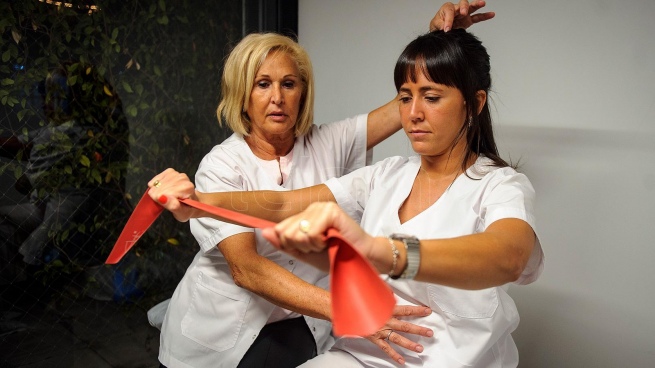The pathologies and pains that some women live with in their vulva may be common, but not normal, a situation little addressed due to shame and lack of information, which prevents them from leading a normal life and enjoying their right to health and sexuality. .
“There are doctors who tell women that it’s normal for their vulva to hurt. It’s common, but it’s not normal,” kinesiologist Sofía Lezcano said in an interview with Télam.
The professional, and her colleague Gabriela Colabella, specialized in treating and preventing pelvic floor dysfunctions.
The pelvic floor includes a set of muscles and ligaments that surround the lower part of the abdominal cavity, supporting the uterus, bladder, intestines, and other pelvic organs.
Women who come to your consultation have urinary incontinence or genital pain.
Télam: Why is there so little talk about these situations?
Gabriela Colabella: Out of shame. It is cultural. The woman normalizes it. And it’s not normal.
“The younger ones think they don’t know how to have sex, and the older ones think their sex life is over. And none of that is true.”gabriela colabella
She, who dedicated her career to performing neurorehabilitation, discovered in her own body the changes that menopause in some women, and began to investigate.
The vaginal dryness that often accompanies this stage of life “does not pass over time, that’s why I started studying. First with the physiotherapist Romina Domenech, and in a pandemic I did online postgraduate courses in Spain,” says the professional who decided to dedicate herself specifically to floor treatments pelvic.
“Now it’s me. I started to rehabilitate myself. I’m very recovered,” she shares with a smile.
And Lezcano came to this specialty “as an alternative; he did not know the treatment of the pelvic floor. It is new in physiotherapy, kinesiology.”
At the age of 29, not so long ago he went to college where he remembers that only once, in his entire career, was the subject mentioned.
“The pelvis is complicated, it is in 3D because it has many planes, movements, it depends on whether the sacrum, the iliac (muscles), ligaments and much more are involved, all this can affect the entire structure of a woman,” he explains.
T: When does a woman need to rehabilitate the pelvic floor?
GC: They are different circumstances. Doing poor strength in the gym can weaken your pelvic floor. Because the pelvic floor has a lot of organs that give weight. If you do an exercise wrong you can have muscle weakness. For example, there are women who lift weights and have leaks because they don’t use strength. Also due to sexual dysfunctions, after childbirth, when going through menopause.
What is done is to rehabilitate to prevent or improve the proper function, with exercises, so that the woman increases her own metabolic system. For the sleeping physiological system to work.
Sofía Lezcano: The education that is part of prevention is very important, from postures, how to exert force, how to sneeze, what to contract, not retain pee, hygiene of the vulva. There is something behavioral that needs to change from childhood.
A first person testimony
By Claudia Fernandez Chaparro*
One day walking down the street I sneezed and a little urine escaped. That intimate, shameful act led me inexorably to remember that the same thing happened to my grandmother, my mother or some friend. Inside, I thought: done! You joined the incontinence club. Because at a certain age, and with total ignorance, many people tell you “it’s normal”.
And there I started endless stream of medical consultations. Luckily, there are social networks that served me as a tool to investigate the problem and discover that there is something called “pelvic floor” and its importance. I was also able to learn how professionals in other countries address this issue. So I was able, in some way, to understand what was happening to me and to find that in our country there are also people who are dedicated to it.
The first time I entered the consultation was to meet with a kinesiologist. I was contained and also I was happy to learn that it has a treatment and also a cure. In the waiting room were young women who had gone through childbirth, as well as middle-aged and older women.
We were all there for the same reason and that made me think of my own delivery, of the little information I had with it, of the pain of an episiotomy that did not help to keep me from tearing, I also remembered the moment where my obstetrician told me about that I could have sex again but I felt like I wasn’t ready.
Since 2004, the day of Respected Childbirth has forced us to think and rethink certain practices, to put into words that crucial and very personal moment that we women in labor go through.
What I learned in this search for information was not to be ashamed, to be able to explore and understand my body, to ask everything, to get rid of my doubts, to go into a sex shop to buy a personal vibrator that, due to its therapeutic effect, is an important part of rehabilitation. To look for a mirror and look at myself, understand and be attentive to the changes of colors, shapes. And above all things, to share information, because women’s sexuality is still taboo, even with friends who don’t dare to speak freely.
I am from a generation that lived with dictatorship and repression and that repression was, in many ways, a generation of talks in the Johnson and Johnson schools as any approach to understanding our body.
There is no reason to lose urine, not to enjoy, feel pain with penetration or urination. There is a pelvic floor to discover. Have you ever heard about its importance? I did not know it either.
*Journalist/Social Psychologist
Pelvic floor treatment
The treatment carried out by professionals is based on changes in habits, behaviors and exercises, which begin with breathing properly or activating the transversus abdominis muscle.
They use a series of elements, among which there are different sex toys.
“In general, women do not touch themselves, they do not masturbate, they do not know their vulva. They do not irrigate the vulva. Through a vibrator, which is regulated, sensitivity is worked on to stimulate the area. It depends on the pathologies, the pain that The woman has, different sex toys or the hand are used. We also use heat, cold and electro stimulators. The receptors of the vulva stimulate the brain and generate the optimal response to improve, “explains Colabella.
On the market there are countless medicines for all kinds of pathologies related to femininity, you just have to pay attention to a television commercial, for example.
There are also drugs for pelvic floor pathologies.
“We do not medicate. There are women with vulvodyniaa chronic pain in the vulva, and they are medicated by the treating doctor until the pain is not perceived, the pain numbs, but it is not rehabilitated and the disorder continues”, explains Lezcano.
The youngest consultant they had was 23 years old. “The younger ones think they don’t know how to have sex, and the older ones think their sex life is over. And none of that is true.”highlights Colabella.
Lezcano indicates that with the pelvic organs “we are in contact all the time: when we go to the bathroom, when we bathe. But women are not ‘allowed’ to enjoy it, it is cultural. There are anguished women who think that everything happens through phallus, by penetration. There are other ways to have sex in the process of getting to know each other and enjoying each other.”
Both work with gynecologists Sandra Magirena and Claudia Scalise “because the treatment must be in a team, comprehensive”, highlight the kinesiologists.
For them, the listening space is fundamental, where shame is left out, and the treatment serves for women to enjoy their health and sexuality.
Reporting on these issues is part of the objective of the International Day of Action for Women’s Health established every May 28 to reaffirm and guarantee the right of all women and girls to enjoy comprehensive health throughout their lives.










